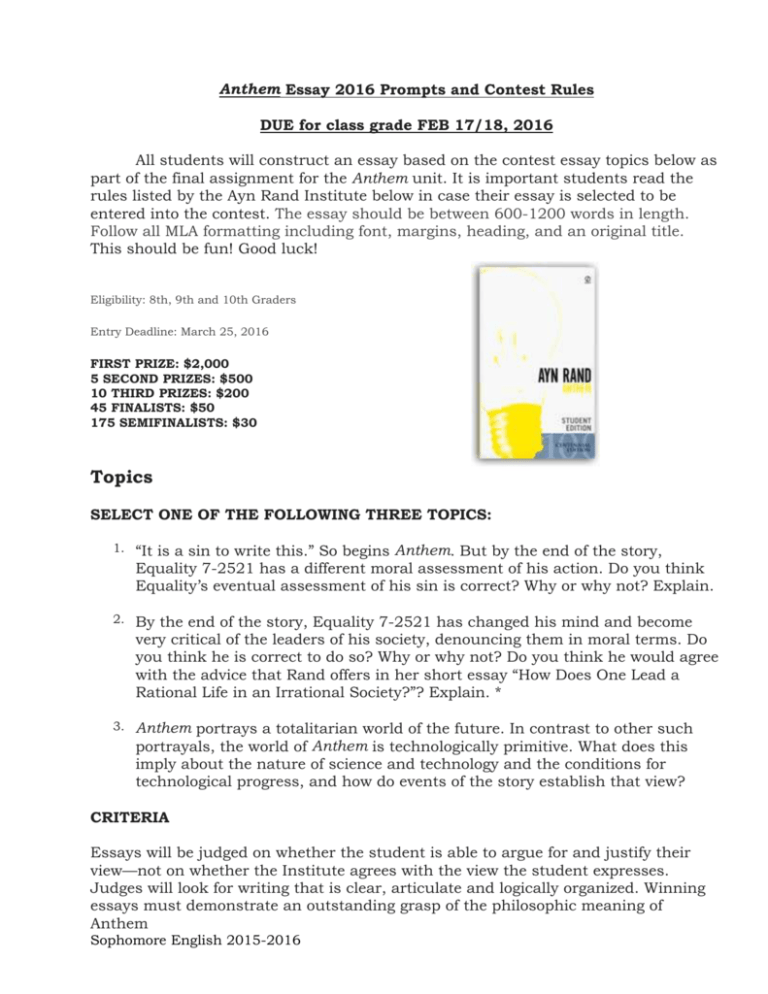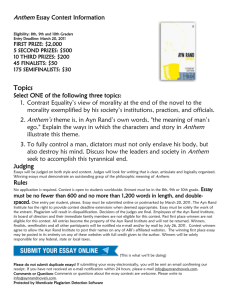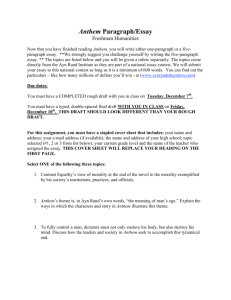Essay prompt and instructions
advertisement

Anthem Essay 2016 Prompts and Contest Rules DUE for class grade FEB 17/18, 2016 All students will construct an essay based on the contest essay topics below as part of the final assignment for the Anthem unit. It is important students read the rules listed by the Ayn Rand Institute below in case their essay is selected to be entered into the contest. The essay should be between 600-1200 words in length. Follow all MLA formatting including font, margins, heading, and an original title. This should be fun! Good luck! Eligibility: 8th, 9th and 10th Graders Entry Deadline: March 25, 2016 FIRST PRIZE: $2,000 5 SECOND PRIZES: $500 10 THIRD PRIZES: $200 45 FINALISTS: $50 175 SEMIFINALISTS: $30 Topics SELECT ONE OF THE FOLLOWING THREE TOPICS: 1. “It is a sin to write this.” So begins Anthem. But by the end of the story, Equality 7-2521 has a different moral assessment of his action. Do you think Equality’s eventual assessment of his sin is correct? Why or why not? Explain. 2. By the end of the story, Equality 7-2521 has changed his mind and become very critical of the leaders of his society, denouncing them in moral terms. Do you think he is correct to do so? Why or why not? Do you think he would agree with the advice that Rand offers in her short essay “How Does One Lead a Rational Life in an Irrational Society?”? Explain. * 3. Anthem portrays a totalitarian world of the future. In contrast to other such portrayals, the world of Anthem is technologically primitive. What does this imply about the nature of science and technology and the conditions for technological progress, and how do events of the story establish that view? CRITERIA Essays will be judged on whether the student is able to argue for and justify their view—not on whether the Institute agrees with the view the student expresses. Judges will look for writing that is clear, articulate and logically organized. Winning essays must demonstrate an outstanding grasp of the philosophic meaning of Anthem Sophomore English 2015-2016 RULES & REQUIREMENTS No application is required. Contest is open to students worldwide, except where void or prohibited by law. Essays must be written in English only. Entrant must be in the 8th, 9th or 10th grade. To avoid disqualification, mailed-in essays must include a stapled cover sheet with the following information: 1. 1. your name and address; 2. 2. your email address (if available); 3. 3. the name and address of your school; 4. 4. topic selected (#1, 2 or 3 from the “Topics” tab); 5. 5. your current grade level; and 6. 6. (optional) the name of the teacher who assigned the essay if you are completing it for classroom credit. Essay must be no fewer than 600 and no more than 1,200 words in length, double-spaced. Spelling errors and/or written corrections (by anyone) found on the essay will count against the final grade and should be omitted before submission. One entry per student. Essay must be submitted online or postmarked by March 25, 2016, no later than 11:59 PM, Pacific standard time. The Ayn Rand Institute has the right to provide contest deadline extensions when deemed appropriate. Essay must be solely the work of the entrant. Plagiarism will result in disqualification. Essays must not infringe on any third-party rights or intellectual property of any person, company or organization. By submitting an essay to this Contest, the entrant agrees to indemnify the Ayn Rand Institute for any claim, demand, judgment or other allegation arising from possible violation of someone’s trademark, copyright or other legally protected interest in any way in the entrant’s essay. Decisions of the judges are final. Employees of the Ayn Rand Institute, its board of directors and their immediate family members are not eligible for this contest. Past first-place winners are not eligible for this contest. All entries become the property of the Ayn Rand Institute and will not be returned. Winners, finalists, semifinalists and all other participants will be notified via email and/or by mail by July 28, 2016. Winners are responsible for providing their mailing addresses and other necessary information under the law in order to receive any prizes. Contest winners agree to allow the Ayn Rand Institute to post their names on any of ARI’s affiliated websites. The first-place essay may be posted in its entirety on any of these websites with full credit given to the author. Winners will be solely responsible for any federal, state or local taxes. Sophomore English 2015-2016




